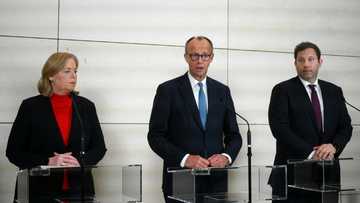New Service Plan in Germany Requires All 18-Year-Old Men to Undergo Military Test
- Germany’s coalition government unveiled a new military service plan aimed at strengthening the Bundeswehr and boosting troop numbers
- The proposal, set to begin in 2027, would require all 18-year-old men to undergo medical screening, while women could volunteer
- The move came as Berlin sought to build Europe’s strongest conventional army amid growing security concerns
Germany’s coalition government confirmed a new military service plan designed to boost troop numbers, following months of political wrangling. The move was presented as part of Berlin’s ambition to build Europe’s strongest conventional army.
Under the plan, all 18-year-old men will be required to complete a questionnaire on their suitability to serve. From July 2027, they will also undergo medical screening to assess fitness for duty.

Source: Getty Images
Women of the same age will receive the questionnaire, though participation will remain voluntary.
Lawmakers are expected to vote on the plan by the end of 2025. If recruitment targets are not met, parliament could consider compulsory enlistment. Officials said that in the event of war, the military would be able to draw on the questionnaires and medical exams to identify potential recruits.
Bundeswehr troop numbers to rise
The Bundeswehr currently has around 182,000 troops. The new model aims to add 20,000 soldiers within the next year, with numbers rising to between 255,000 and 260,000 over the next decade. Around 200,000 reservists are expected to supplement the force.
When Chancellor Friedrich Merz’s CDU/CSU conservatives formed a coalition with the centre-left SPD earlier this year, they agreed to re-introduce military service, initially on a voluntary basis.
Rheinmetall chief backs government plan
Armin Papperger, CEO of Rheinmetall, Germany’s largest defence company, told the BBC that Merz’s aim to strengthen the Bundeswehr was “realistic”. He said “clear decisions” were coming from government and believed the target could be met within five years.
Papperger added that Germany had to be “ready in ’29”, echoing warnings from defence chief Gen Carsten Breuer earlier this year that NATO must prepare for a possible Russian attack within four years.
He also noted that European rearmament had boosted Rheinmetall’s revenues, saying: “We make a lot of money because there is a huge demand.” He highlighted investment in vehicles, ammunition, satellites, electronics and artificial intelligence.
Public opposition to mandatory service
The plan has faced criticism from parts of Germany’s political left and from many young people. A Forsa survey for Stern magazine suggested that while just over half of respondents supported compulsory service, opposition rose to 63% among those aged 18 to 29.
“I don’t want to go to war because I don’t want to die or I don’t want to be shot at,” said Jimi, a 17-year-old student from Berlin, who joined an anti-conscription protest outside the Bundestag earlier this week. “I also don’t want to shoot people.”
He described an attack against Germany as “an unlikely and abstract scenario” used by government to justify “stealing millions of young people’s right to decide what they should be doing”.
Young recruits see deterrent value
Others have taken a different view. Jason, a 21-year-old who joined the Bundeswehr earlier this year, said: “I wanted to contribute to defend peace, to defend democracy if the worst happens.” He explained that by enlisting he was “giving back to society” and believed in the deterrent power of the army, “so potential enemies don’t even think about attacking you”.

Read also
"Soldiers are dying, the system has failed," Ex-SGF Babachir Lawal blasts Tinubu over insecurity war
Defence minister seeks reassurance
Defence Minister Boris Pistorius sought to calm public fears, saying there was “no cause for concern… no reason for fear”. He argued that stronger armed forces would reduce the risk of conflict: “The more capable of deterrence and defence our armed forces are, through armament through training and through personnel, the less likely it is that we will become a party to a conflict at all.”
Germany suspended conscription in 2011 after defence spending fell sharply following the Cold War. The country has long been cautious about military power, but Merz declared earlier this year that German defence “now has to be whatever it takes” after Russia’s full-scale invasion of Ukraine.

Read also
Ex-CAN president supports America's planned invasion, claims Muslims are killing Christians
NATO allies across Europe have faced pressure from President Donald Trump’s White House to increase defence budgets. Papperger, whose company also supplies Ukraine, said Europe was not in a peaceful time, describing the current situation as “whatever you call it, it’s not a peaceful time”.
Germany unveils debt-laden budget, relief measures
Legit.ng earlier reported that the German parliament's budget committee has approved revised 2026 spending plans that include even higher debts than originally thought, lawmakers said Friday, as the government gears up for an investment splurge.
Chancellor Friedrich Merz and his coalition partners also agreed further measures late Thursday aimed at helping Europe's struggling top economy, chief among them a reduction in industrial power prices.
Source: Legit.ng




